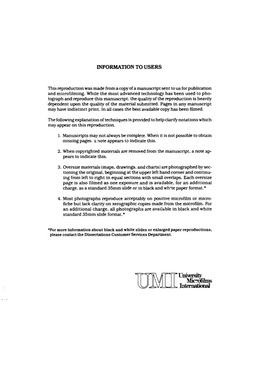| dc.contributor.author | Abdallah, Abedelfattah Lutfi, | en_US |
| dc.date.accessioned | 2013-08-16T12:29:28Z | |
| dc.date.available | 2013-08-16T12:29:28Z | |
| dc.date.issued | 1985 | en_US |
| dc.identifier.uri | https://hdl.handle.net/11244/5398 | |
| dc.description.abstract | To address these and related questions, a questionnaire was mailed to each of the water managers in the selected Oklahoma towns and cities. The questionnaire was completed by 49 of the 60 managers who were requested to participate in the study. The obtained data were then analyzed using contingency tables. | en_US |
| dc.description.abstract | This study is concerned with Oklahoma water managers' attitudes toward the adoption or rejection of long-term water conservation options in small and medium sized cities under 50,000 in population. | en_US |
| dc.description.abstract | These results did not concur with Oklahoma state water policies which emphasized water supply augmentation solutions. But still, state efforts are needed to provide studied communities in order to encourage them to adopt permanent water conservation strategies. | en_US |
| dc.description.abstract | The results of the study indicated that local water managers considered local governments as the most appropriate body to deal with water management issues. Local water managers in Oklahoma also place heavy reliance upon traditional structural solutions. If these solutions prove to be inadequate, long-term water conservation alternatives become more appealing. However, Oklahoma water managers in the selected cities and towns expressed their profound concerns about the potential revenue loss of long-term water conservation measures were to be adopted and implemented. Respondents also realized that implementing long-term water conservation alternatives often require sophisticated preparation and execution to be successful. | en_US |
| dc.description.abstract | In focusing upon Oklahoma water managers' attitudes, the following questions are addressed: (1) What factors influence Oklahoma water managers' attitudes toward the adoption or rejection of long-term water conservation measures? (2) What are the major incentives or disincentives that may encourage or discourage the adoption and implementing of long-term water conservation alternatives at the municipal level in Oklahoma? (3) What are the distinct geographical variations in attitudes toward adopting water conservation policies? | en_US |
| dc.format.extent | ix, 150 leaves : | en_US |
| dc.subject | Geography. | en_US |
| dc.subject | Water conservation Oklahoma Management. | en_US |
| dc.subject | Environmental Sciences. | en_US |
| dc.title | Water conservation as a long-range strategy in municipal water supply planning : | en_US |
| dc.type | Thesis | en_US |
| dc.thesis.degree | Ph.D. | en_US |
| dc.thesis.degreeDiscipline | Department of Geography and Environmental Sustainability | en_US |
| dc.note | Source: Dissertation Abstracts International, Volume: 46-12, Section: A, page: 3827. | en_US |
| ou.identifier | (UMI)AAI8604581 | en_US |
| ou.group | College of Atmospheric & Geographic Sciences::Department of Geography and Environmental Sustainability | |
